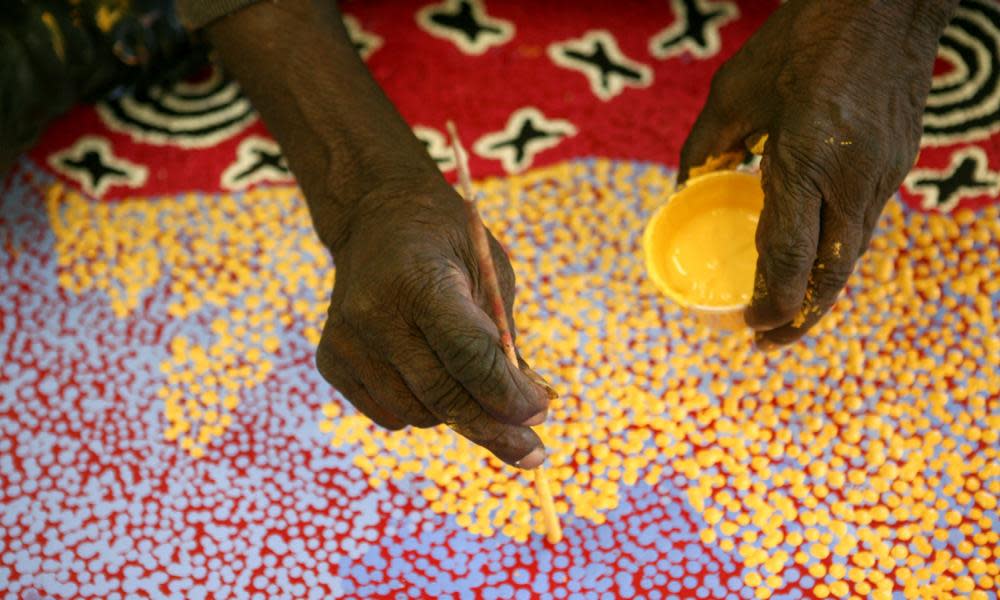Australian government unveils plan to support Aboriginal artists and guard against fake works

The federal government has unveiled a new plan to support Indigenous artists in regional and remote Australia, including strengthened measures to guard against fake and counterfeit artworks.
But a collective of Indigenous artists in the heart of the country have said that while the annual $5m added to the existing $22m a year in funding support is welcome, the new initiatives do nothing to stop unscrupulous dealers effectively holding vulnerable artists hostage.
On Thursday, the arts minister, Paul Fletcher, announced his National Indigenous Visual Arts Action Plan, which will include improved fast broadband to connect remote Indigenous artists and help them connect to external art markets; digital labelling to protect the integrity of original works; negotiating reciprocal agreements with international counterparts for overseas royalty resales, and an increase to $27m a year in funding.
Related: ‘Worse than negligence’: NSW dragging feet on Aboriginal child removal reforms
Fletcher said the action plan would reinforce economic opportunities for Aboriginal and Torres Strait Islander artists, organisations and businesses.
“The Morrison government’s action plan will help safeguard the cultural knowledge which underpins the work of Australia’s world-renowned Indigenous visual artists, while investing in sustainable economic opportunities for a modern digital environment,” he said in a media statement.
The Indigenous affairs minister, Ken Wyatt, said the plan would encourage sustainable growth while protecting the cultural interests of artists and organisations.
“We’ve undertaken extensive consultation with Aboriginal and Torres Strait Islander artists, together with commercial galleries, auction houses, wholesalers and the state and territory governments – because successful outcomes requires Indigenous Australians to be at the table,” he said.
Skye O’Meara is the general manager of the APY Art Centre Collective, a group of 10 Indigenous owned and governed enterprises spread across central Australia.
She told Guardian Australia the extra annual financial commitment was much needed and would help the collective to support young emerging artists, provide more gallery spaces and studio spaces for learning skills and provide professional development opportunities.
“The main sources of government funding through the existing system are not responsive to changes in community or open to innovation or new models,” O’Meara said.
“We hope that this is something that’s addressed with these new funds.
“But there are many artists across the regions of South Australia who are still lacking meaningful support, and the APY art centres are their only source of independent income and meaningful employment opportunities.
“Our biggest challenge in the industry remains unethical and unscrupulous private dealers that are based in Alice Springs – they are the single biggest threat to APY artists and to the community-owned art centres.”
O’Meara said the Indigenous art code of conduct had been ineffective in stamping out the so-called carpetbaggers, outsiders who effectively indenture local artists, forcing them into sheds to paint and pay off debts.
The practice was exposed by the Guardian in 2019.
Email: sign up for our daily morning briefing newsletter
App: download the free app and never miss the biggest stories, or get our weekend edition for a curated selection of the week's best stories
Social: follow us on YouTube, Facebook, Instagram, Twitter or TikTok
Podcast: listen to our daily episodes on Apple Podcasts, Spotify or search "Full Story" in your favourite app
“The [new action plan] does nothing to address this issue, which requires immediate and focused attention,” O’Meara said.
“Unscrupulous private dealers remain the single biggest threat and the biggest challenge to Indigenous artists from the APY.”
Fletcher said the Morrison government would conduct a mid-point assessment of the action plan in December 2023 and if needed adjust the plan to tackle the most urgent priorities in the sector.


